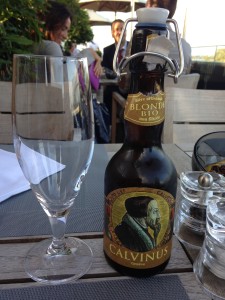
After a challenging travel marathon of nearly 20 hours, including mechanical problems with planes and weather delays, we have returned home from our Rhone River excursion.
There was much we saw on the trip and the challenge was, as always, determining what to mention in the blog posts.
One thing I didn’t mention was that Geneva is home to Calvinus beer, just as Godfrey de Boullon’s castle in Belgium boasted a Godfrey brew, a fact I failed to mention in a previous travel journal. Obviously, I had to sample a bottle of Calvinus.
For many in Switzerland and Belgium, Calvinus beer and Godfrey beer may be all they know of these two great men.
That was a recurring question for me on this trip, “What is the spiritual condition of these towns today, and how should we interpret that from a Kingdom-perspective?”
As we entered each town I checked Wikipedia for the statistics on the local religious culture. The percentage who identified themselves as Catholic or Protestant was almost always modest at best, and those numbers were probably exaggerated by the merely ritualistic or non-practicing religious who answered affirmatively to the poll.
In Tournon, for example, a local guide told us that a certain percentage declared themselves Catholic “but most are not truthful because I only saw 4 people at mass last Sunday.”
Calvin, even at the height of Geneva’s transformation, wrote he only believed one in ten in the city to be true believers. On days when he was less optimistic he wrote the number may be as low one in one-hundred.
The chief opposition of early Christianity as we saw on this tour was the paganism of the Roman Empire. Jesus promised that paganism would not prevail against the Church, and He was proven correct. For Calvin, Luther and the Reformers the chief opposition to the advance of the kingdom of God was an apostate church. The Reformers responded to the call of King Jesus in their generation and help set the Church back on the proper foundation.
The chief opposition to the advance of the kingdom of God today in the West is an opponent largely unknown to the early Christians and unthinkable to the Reformers: secularism. Of the philosophical challenges to the advance of the kingdom of God, however, secularism, while relatively new is by far the most feeble. At least Roman paganism and medieval Catholicism was theistic, offered an ethos and the hope for meaning in life. Secularism is contrary to man’s most basic intuitive knowledge—that of God’s existence and sovereignty over the earth.
And while Geneva is certainly no longer a Christian city to the extent it was in Calvin’s day, the time since the Reformation has seen the Gospel spread to the Americas and other places like China and South Korea.
The kingdom of God has continued to advance on the earth and will continue to do so, and it will do so as great men and woman like Constantine, Blandina and the martyrs of Lyon, and John Calvin make courageous decisions for the kingdom of God and are willing to lay down their lives for King Jesus. GS
